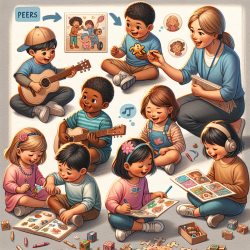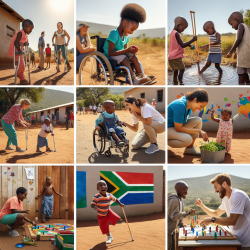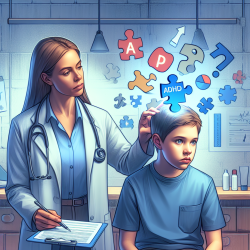Introduction
In the realm of speech-language pathology, creating meaningful and lasting outcomes for children with Autism Spectrum Disorder (ASD) is a top priority. A recent study titled "Long-Term Treatment Outcomes of PEERS® for Preschoolers: A Parent-Mediated Social Skills Training Program for Children with Autism Spectrum Disorder" sheds light on the potential of parent-mediated interventions to create lasting social skills improvements in young children with ASD. This blog explores the key findings of this research and provides actionable insights for practitioners seeking to enhance their skills and outcomes in this area.
The Study at a Glance
The research focused on the PEERS® for Preschoolers program, a parent-mediated social skills training initiative designed for preschool-aged children with ASD. The study followed 29 families over a period of 1 to 5 years post-intervention to assess the durability of treatment gains. The results were promising, indicating that the program effectively maintained improvements in social communication, social responsiveness, and peer engagement.
Key Findings
- Social Communication: The study found that children maintained improvements in social communication skills, which are crucial for engaging in meaningful interactions with peers.
- Social Responsiveness and Motivation: Gains in social responsiveness and motivation were sustained, highlighting the program's effectiveness in fostering long-term engagement with peers.
- Peer Engagement: Increased frequency of playdates was observed, suggesting enhanced social integration and opportunities for developing friendships.
- Parenting Stress: Although initial reductions in parenting stress were noted, these gains were not maintained over the long term, indicating a need for ongoing support for families.
Implications for Practitioners
For practitioners, the study underscores the importance of integrating parent-mediated interventions into early childhood programs for children with ASD. By involving parents in the intervention process, practitioners can facilitate the generalization of skills beyond the clinical setting, leading to more robust and lasting outcomes.
Practitioners are encouraged to:
- Incorporate parent training into social skills programs to enhance the generalization of skills.
- Focus on concrete, stepwise teaching methods that align with the developmental needs of preschool-aged children.
- Provide ongoing support to families to address evolving social demands as children transition into elementary school.
Encouraging Further Research
While the findings are promising, the study also highlights the need for further research to explore the long-term impacts of parent-mediated interventions. Practitioners are encouraged to contribute to this growing body of knowledge by conducting follow-up studies and sharing their insights and experiences.
Conclusion
The PEERS® for Preschoolers program demonstrates the potential for parent-mediated interventions to create lasting improvements in social skills for children with ASD. By leveraging these findings, practitioners can enhance their approaches and contribute to better outcomes for children and their families.
To read the original research paper, please follow this link: Long-Term Treatment Outcomes of PEERS® for Preschoolers: A Parent-Mediated Social Skills Training Program for Children with Autism Spectrum Disorder.










